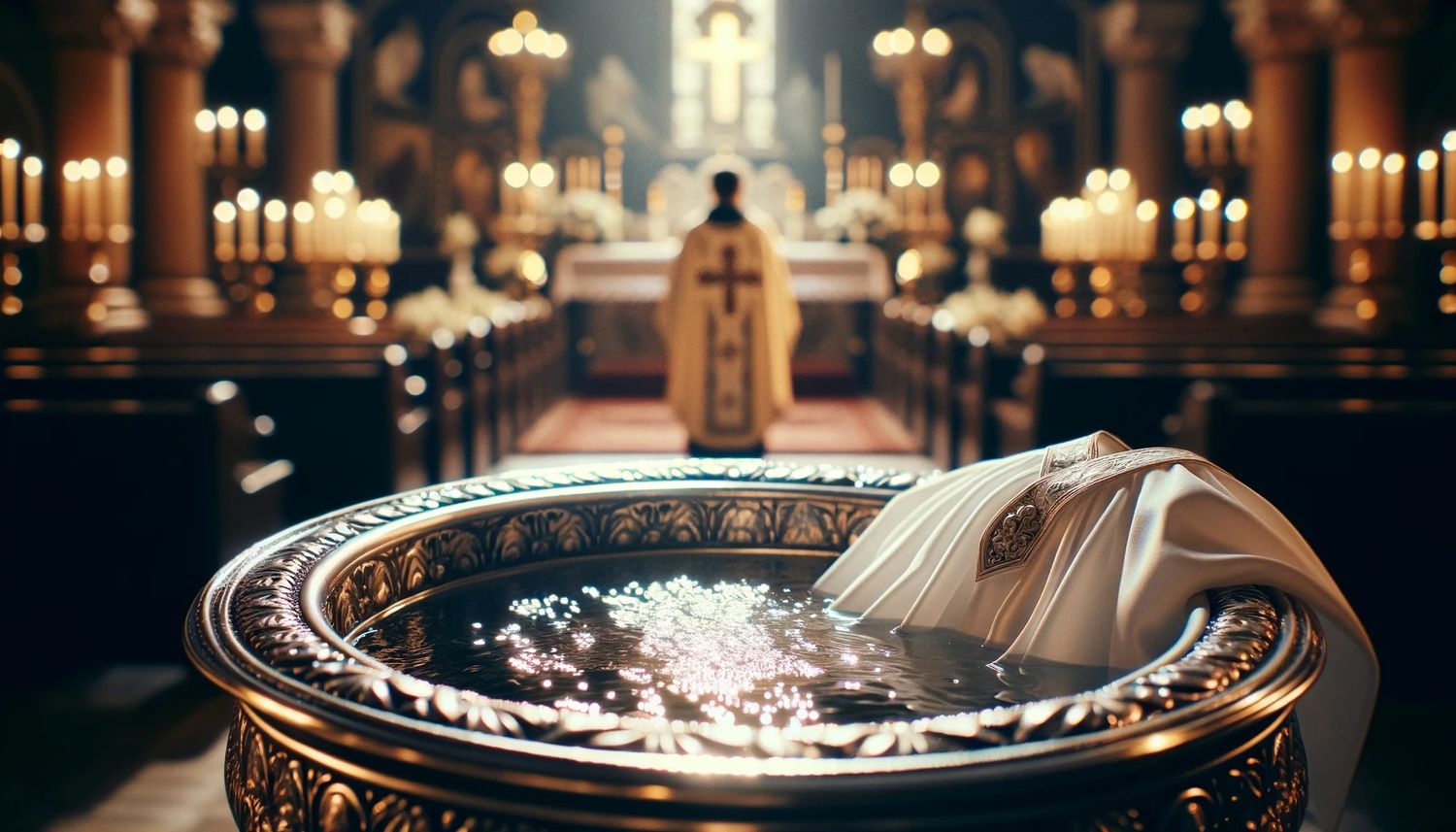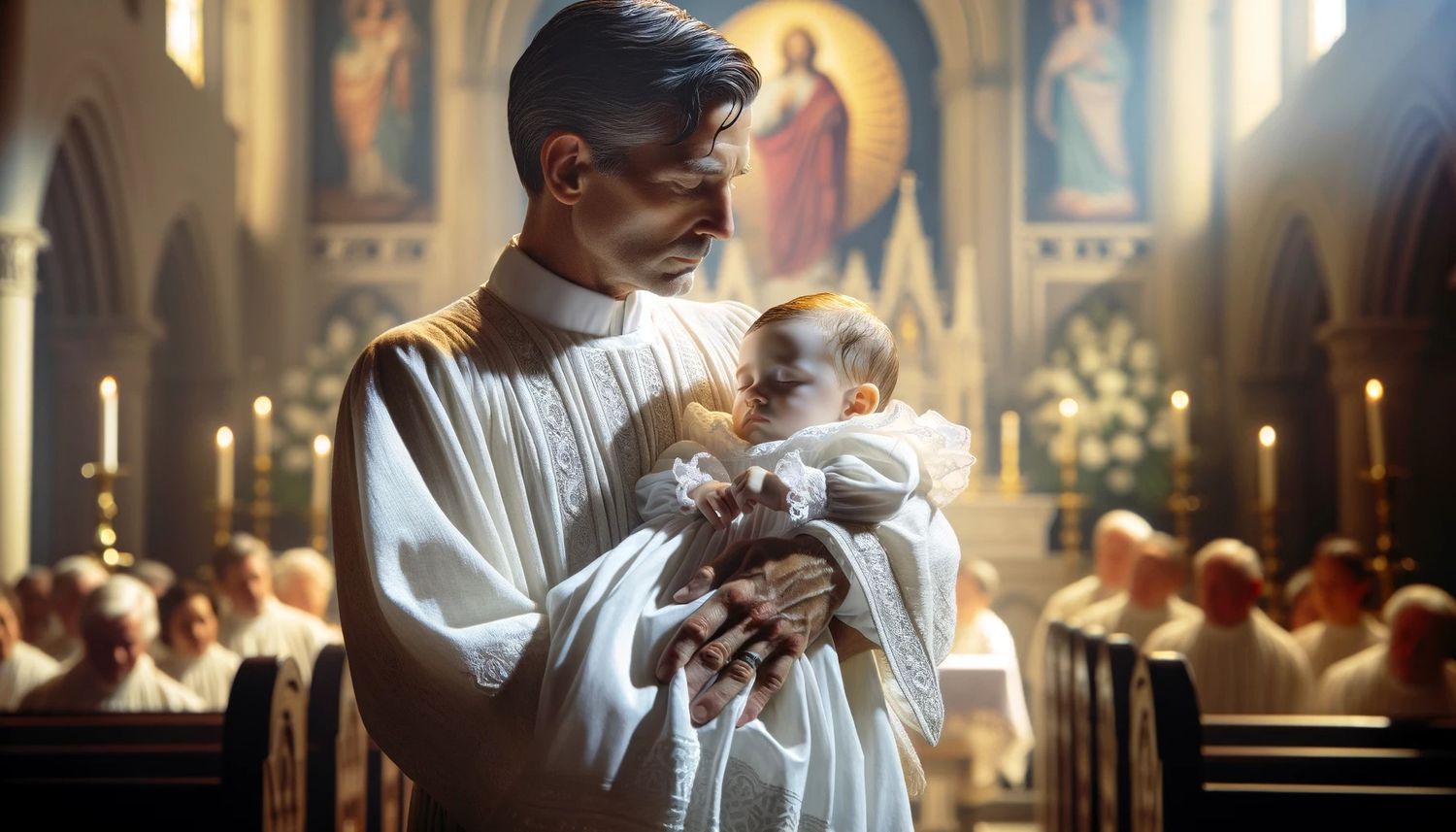Home>Theology and Spirituality>What Do Godparents Say At Catholic Baptism


Theology and Spirituality
What Do Godparents Say At Catholic Baptism
Published: March 2, 2024
Ericka Andersen, an editor at Christian.net, expertly merges digital strategy with content creation, focusing on faith and societal issues. Her communication skills enhance the platform's engaging narratives, fostering meaningful dialogue on belief's impact on society.
Discover what godparents say at Catholic baptism and the significance of their role in the theology and spirituality of the ceremony. Gain insight into the responsibilities and blessings of being a godparent.
(Many of the links in this article redirect to a specific reviewed product. Your purchase of these products through affiliate links helps to generate commission for Christian.net, at no extra cost. Learn more)
Table of Contents
The Role of Godparents in Catholic Baptism
Godparents play a crucial role in the Catholic baptism ceremony. They are chosen to guide and support the child in their faith journey. The role of godparents is not just a symbolic one; it comes with significant responsibilities and commitments. Here are the key aspects of the role of godparents in Catholic baptism:
-
Spiritual Guidance: One of the primary roles of godparents is to provide spiritual guidance to the child. They are expected to be role models in the faith, helping the child to grow in their understanding of Catholic beliefs and values.
-
Support and Encouragement: Godparents are there to offer unwavering support and encouragement to the child as they navigate their faith. This includes attending religious events, offering advice, and being a source of comfort in times of need.
-
Prayer and Mentorship: Godparents are encouraged to pray for the child regularly and to be a mentor in matters of faith. They should be available to answer questions, provide insight, and help the child develop a strong spiritual foundation.
-
Lifelong Commitment: The role of a godparent is not limited to the baptism ceremony; it is a lifelong commitment. Godparents are expected to maintain a consistent presence in the child's life, nurturing their spiritual growth at every stage.
-
Promises and Vows: During the baptism ceremony, godparents make solemn promises and vows to fulfill their role to the best of their ability. These promises signify the depth of their commitment to the child and their spiritual well-being.
In essence, the role of godparents in Catholic baptism goes beyond just being present at the ceremony. It is a sacred duty to guide, nurture, and support the child in their Catholic faith, ensuring that they grow to embrace the teachings of the Church and live a life rooted in Christian values.
Read more: Who Can Be A Godparent At A Catholic Baptism
Responsibilities of Godparents in the Catholic Church
-
Spiritual Guidance: Godparents are entrusted with the responsibility of providing spiritual guidance to the child. This involves setting an example of faith through their own actions and being a source of wisdom and support as the child grows in their understanding of Catholic beliefs.
-
Support and Encouragement: Godparents are expected to offer unwavering support and encouragement to the child in their faith journey. This may include attending religious events, offering advice, and being a pillar of strength during challenging times.
-
Prayer and Mentorship: Godparents are encouraged to pray for the child regularly and to serve as mentors in matters of faith. They should be available to answer questions, provide insight, and help the child develop a strong spiritual foundation.
-
Lifelong Commitment: The role of a godparent extends beyond the baptism ceremony; it is a lifelong commitment. Godparents are expected to maintain a consistent presence in the child's life, nurturing their spiritual growth at every stage.
-
Promises and Vows: During the baptism ceremony, godparents make solemn promises and vows to fulfill their role to the best of their ability. These promises signify the depth of their commitment to the child and their spiritual well-being.
In summary, the responsibilities of godparents in the Catholic Church are multifaceted and significant. They are called to be mentors, guides, and sources of unwavering support for the child as they embark on their journey of faith within the Catholic tradition.
The Importance of Godparents' Promises in Catholic Baptism
The promises made by godparents in the Catholic baptism ceremony hold immense significance in the life of the child and the faith community. These promises are not mere formalities; they are solemn commitments that shape the spiritual journey of the child and reflect the godparents' dedication to their role. The importance of these promises can be understood through the following key points:
-
Commitment to Spiritual Guidance: When godparents make promises during the baptism ceremony, they are affirming their commitment to providing spiritual guidance to the child. This commitment goes beyond words; it signifies a pledge to actively support the child's growth in faith, serving as a constant source of encouragement and wisdom.
-
Role Modeling and Mentorship: By making promises, godparents acknowledge their responsibility to serve as role models and mentors in matters of faith. Their promises reflect a commitment to living a life aligned with Catholic teachings and being a source of inspiration and guidance for the child.
-
Support and Encouragement: The promises made by godparents underscore their pledge to offer unwavering support and encouragement to the child. This support extends to being present in the child's life, attending religious events, and providing emotional and spiritual guidance as the child navigates their faith journey.
-
Prayer and Intercession: Godparents' promises also emphasize their commitment to praying for the child and interceding on their behalf. This act of prayerful support is a vital aspect of the godparent's role, reflecting their dedication to nurturing the child's spiritual well-being through the power of prayer.
-
Lifelong Dedication: The promises made by godparents are a testament to their lifelong dedication to the child's spiritual growth. It signifies an enduring commitment to being a consistent presence in the child's life, offering guidance, support, and love as the child matures in their faith.
In essence, the promises made by godparents in the Catholic baptism ceremony are a profound declaration of their commitment to the spiritual welfare of the child. These promises serve as a cornerstone of the godparent-child relationship, shaping the child's understanding of faith and providing them with a steadfast source of support and guidance as they embrace their Catholic identity.
Godparents' Vows and Commitments in the Catholic Baptism Ceremony
The vows and commitments made by godparents in the Catholic baptism ceremony are deeply significant and carry profound implications for the spiritual journey of the child. These vows and commitments are not mere formalities; they represent a sacred pledge to uphold the responsibilities of godparenthood with unwavering dedication. The following aspects highlight the depth of godparents' vows and commitments in the Catholic baptism ceremony:
Solemn Promises
During the baptism ceremony, godparents make solemn promises to renounce sin, profess their faith in Christ, and commit to supporting the child in their journey of faith. These promises are a testament to the godparents' willingness to embrace their role with sincerity and devotion, acknowledging the gravity of their commitments.
Read more: What Do Godparents Do At First Communion
Affirmation of Faith
Godparents' vows include a public affirmation of their own faith in the teachings of the Catholic Church. By professing their commitment to the Catholic faith, godparents set an example for the child and pledge to guide them in understanding and embracing the principles of Catholicism.
Support and Guidance
Through their vows, godparents express their dedication to providing unwavering support and guidance to the child in matters of faith. This includes nurturing the child's spiritual growth, offering counsel, and being a steadfast presence in the child's life as they navigate their Catholic identity.
Role Modeling
The vows made by godparents signify their commitment to serving as positive role models for the child. By pledging to live a life in accordance with Catholic teachings, godparents aim to inspire the child through their actions, demonstrating the values and virtues upheld by the Church.
Prayerful Intercession
Godparents' vows also encompass a commitment to praying for the child and interceding on their behalf. This act of prayerful support reflects the godparents' understanding of the power of prayer in nurturing the child's spiritual well-being and seeking divine guidance for the child's journey of faith.
Lifelong Dedication
The vows and commitments made by godparents extend beyond the baptism ceremony; they signify a lifelong dedication to the child's spiritual welfare. Godparents pledge to uphold their role with enduring commitment, remaining steadfast in their support and guidance as the child grows in their faith.
In essence, the vows and commitments made by godparents in the Catholic baptism ceremony are a sacred declaration of their dedication to nurturing the child's faith and spiritual development. These vows serve as a cornerstone of the godparent-child relationship, embodying the profound responsibilities and commitments inherent in the role of godparenthood within the Catholic Church.













